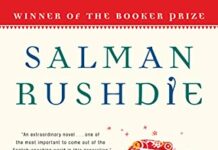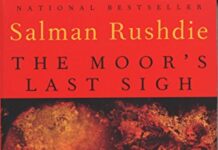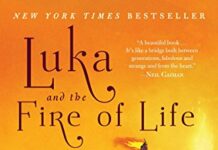
Ebook Info
- Published: 2015
- Number of pages:
- Format: EPUB
- File Size: 6.75 MB
- Authors: Salman Rushdie
Description
NEW YORK TIMES BESTSELLER • NAMED ONE OF THE BEST BOOKS OF THE YEAR BY The Washington Post • Los Angeles Times • San Francisco Chronicle • Harper’s Bazaar • St. Louis Post-Dispatch • The Guardian • The Kansas City Star • National Post • BookPage • Kirkus ReviewsFrom Salman Rushdie, one of the great writers of our time, comes a spellbinding work of fiction that blends history, mythology, and a timeless love story. A lush, richly layered novel in which our world has been plunged into an age of unreason, Two Years Eight Months and Twenty-Eight Nights is a breathtaking achievement and an enduring testament to the power of storytelling. In the near future, after a storm strikes New York City, the strangenesses begin. A down-to-earth gardener finds that his feet no longer touch the ground. A graphic novelist awakens in his bedroom to a mysterious entity that resembles his own sub–Stan Lee creation. Abandoned at the mayor’s office, a baby identifies corruption with her mere presence, marking the guilty with blemishes and boils. A seductive gold digger is soon tapped to combat forces beyond imagining. Unbeknownst to them, they are all descended from the whimsical, capricious, wanton creatures known as the jinn, who live in a world separated from ours by a veil. Centuries ago, Dunia, a princess of the jinn, fell in love with a mortal man of reason. Together they produced an astonishing number of children, unaware of their fantastical powers, who spread across generations in the human world. Once the line between worlds is breached on a grand scale, Dunia’s children and others will play a role in an epic war between light and dark spanning a thousand and one nights—or two years, eight months, and twenty-eight nights. It is a time of enormous upheaval, in which beliefs are challenged, words act like poison, silence is a disease, and a noise may contain a hidden curse. Inspired by the traditional “wonder tales” of the East, Salman Rushdie’s novel is a masterpiece about the age-old conflicts that remain in today’s world. Two Years Eight Months and Twenty-Eight Nights is satirical and bawdy, full of cunning and folly, rivalries and betrayals, kismet and karma, rapture and redemption.Praise for Two Years Eight Months and Twenty-Eight Nights“Rushdie is our Scheherazade. . . . This book is a fantasy, a fairytale—and a brilliant reflection of and serious meditation on the choices and agonies of our life in this world.”—Ursula K. Le Guin, The Guardian “One of the major literary voices of our time . . . In reading this new book, one cannot escape the feeling that [Rushdie’s] years of writing and success have perhaps been preparation for this moment, for the creation of this tremendously inventive and timely novel.”—San Francisco Chronicle “A wicked bit of satire . . . [Rushdie] riffs and expands on the tales of Scheherazade, another storyteller whose spinning of yarns was a matter of life and death.”—USA Today “A swirling tale of genies and geniuses [that] translates the bloody upheavals of our last few decades into the comic-book antics of warring jinn wielding bolts of fire, mystical transmutations and rhyming battle spells.”—The Washington Post “Great fun . . . The novel shines brightest in the panache of its unfolding, the electric grace and nimble eloquence and extraordinary range and layering of his voice.”—The Boston GlobeFrom the Hardcover edition.
User’s Reviews
Editorial Reviews: Review “[Salman] Rushdie is our Scheherazade, inexhaustibly enfolding story within story and unfolding tale after tale with such irrepressible delight that it comes as a shock to remember that, like her, he has lived the life of a storyteller in immediate peril. . . . This book is a fantasy, a fairytale—and a brilliant reflection of and serious meditation on the choices and agonies of our life in this world. . . . I like to think how many readers are going to admire the courage of this book, revel in its fierce colors, its boisterousness, humor and tremendous pizzazz, and take delight in its generosity of spirit.”—Ursula K. Le Guin, The Guardian “Incandescent . . . brilliant, ambitious . . . Before the arrival of his latest novel, Two Years Eight Months and Twenty-Eight Nights, Rushdie’s stature as one of the major literary voices of our time was already secure. And yet, in reading this new book, one cannot escape the feeling that all those years of writing and success have perhaps been preparation for this moment, for the creation of this tremendously inventive and timely novel.”—San Francisco Chronicle “A wicked bit of satire . . . [Rushdie] riffs and expands on the tales of Scheherazade, another storyteller whose spinning of yarns was a matter of life and death.”—USA Today“In these nested, swirling tales, Rushdie conjures up a whole universe of jinn slithering across time and space, meddling in human affairs and copulating like they’ve just been released from twenty years in a lamp. . . . Two Years Eight Months and Twenty-Eight Nights translates the bloody upheavals of our last few decades into the comic-book antics of warring jinn wielding bolts of fire, mystical transmutations and rhyming battle spells.”—The Washington Post “Great fun . . . The novel shines brightest in the panache of its unfolding, the electric grace and nimble eloquence and extraordinary range and layering of his voice.”—The Boston Globe“Courageous and liberating . . . a breathless mash-up of wormholes, mythical creatures, current affairs and disquisitions on philosophy and theology.”—The New York Times Book Review“This is Rushdie’s first [novel] for adults since 2008, and he seems to be having fun with the adult content. He works in jokes about the sexual appetites of his jinn, brings alive dark corners of Manhattan, explores misplaced love, and creates a good-versus-evil battle that’s firmly grounded in philosophy. . . . Two Years Eight Months and Twenty-Eight Nights is erudite without flaunting it, an amusement park of a pulpy disaster novel that resists flying out of control by being grounded by religion, history, culture and love.”—Los Angeles Times “[A] rambunctious, satirical, and bewitching metaphysical fable, perhaps his most thoroughly enjoyable to date. At once a scholar, rigorous observer, and lavishly imaginative novelist, Rushdie channels his well-informed despair over the brutality and absurdity of human life into works of fantasy. . . . Rushdie is having wickedly wise fun here. Every character has a keenly hilarious backstory, and the action (flying carpets and urns, gigantic attacking serpents, lightning strikes, to-the-death combat, sex) surges from drastic and pulse-raising to exuberantly madcap, magical, and genuinely emotional. . . . [A] fantastically inventive, spirited, astute, and delectable update of One Thousand and One Nights.”—Booklist (starred review) “A boisterous novel of ideas, a spirited manifesto for reason disguised as a tale of a jinn war lasting exactly two years, eight months and twenty-eight nights, or 1,001 nights . . . What results is hallmark Rushdie: a composite of magic realism, mythology, science fiction and straight-up fantasy. . . . Like the best Rushdie novels, Two Years is playful and inventive, and also intellectually bracing.”—The Globe and Mail“One of his very best books, one whose governing metaphor can be about many terrible truths indeed . . . a sometimes archly elegant, sometimes slightly goofy fairy tale—with a character named Bento V. Elfenbein, how could it be entirely serious?—for grown-ups . . . Beguiling and astonishing, wonderful and wondrous. Rushdie at his best.”—Kirkus Reviews (starred review)“A comic novel about Medieval Islamic philosophy, fairies and the near end of the world may sound difficult. Rushdie’s brilliance is in the balance between high art and pop culture. . . . This is a novel of both intellectual heft and sheer reading pleasure—a rare feat.”—St. Louis Post-Dispatch“There are monsters who slip through wormholes, or slits between worlds; there are battles and set pieces, in Fairyland and on Earth; there are sometimes ridiculous, sometimes hilarious comic turns; stories within stories; riddles within tales within legends. And there is Salman Rushdie, manic Scheherazade, assuming all the voices, playing all the parts, making a mad kind of sense of it all.”—Minneapolis Star Tribune “The title adds up to 1,001 nights, an allusion to the story of Scheherazade, and although there are not 1,001 strands of story here, there are many, and they are colourful and compelling. . . . Rushdie displays the wry humour that helped make Midnight’s Children such a masterpiece.”—The Independent“Two Years Eight Months and Twenty-Eight Nights is replete with fantastical creatures, scary monsters, very bad men (or rather, male jinns/genies) and one heroic woman. . . . While Rushdie has written hyped up sagas of worlds colliding before, and always espouses reason over fanaticism, there is something so loopy, so unleashed, about this tale as to make it particularly thrilling.”—New York Daily News“In his latest novel, Rushdie invents his own cultural narrative—one that blends elements of One Thousand and One Nights, Homeric epics, and sci-fi and action/adventure comic books. . . . Referencing Henry James, Mel Brooks, Mickey Mouse, Gracian, Bravo TV, and Aristotle, among others, Rushdie provides readers with an intellectual treasure chest cleverly disguised as a comic pop-culture apocalyptic caprice.”—Publishers Weekly (starred review)From the Hardcover edition.
Reviews from Amazon users which were colected at the time this book was published on the website:
⭐After reading a lot of urban fantasy mostly using First Nation and Northern European myths and creation stories this was the first book I read with beings that populated New York and the Americas that came from India and environs. What a joy and it goes on my “I’ll read this again”bookshelves.
⭐TYEMTN has all the makings of a Rushdie classic: an epic tale of love, humor, and violence peopled by characters both mythical and mortal. This time Rushdie concerns himself with an apocalyptic good v. evil battle between the great jinn for earth.If you’ve never read Rushdie, you’ll either love or hate his luscious, florid prose, the countless but memorable rabble of characters, and his satirical brand of magical realism. Midnight’s Children and Satanic Verses are favorites of mine, so I dropped everything to read Rushdie’s latest.The premise: Dunia, an earlobeless jinnia takes the form of a human girl and falls in love with doctor Ibn Rushd, rather, a philosopher who cannot say he is a philosopher because he has been exiled for heresy to the small Spanish town of Lucena. In the first few pages Rushdie has already involved politics, magic, love, satire and a hint of deceit, as Dunia does not reveal to Ibn that she is a jinnia as she begins to birth him great litters of children in their two years together. So far so good, everything I love about a Rushdie novel.When Ibn dies, Dunia returns to the upper world of the jinn, and the slits between the two worlds close for several millennia. When they finally reopen, evil jinn rush in to wreak havoc on men for no particular reason I can remember other than the fun of it, and Dunia returns as well to gather her descendants together to fight them, for when she fell in love with Ibn she fell in love also with the human race.As always, Rushdie’s creativity and talent are boundless. If you like his style, you’ll like it just as much when you’ve finished TYEMTN, which also happens to be politically relevant, philosophically evocative, and allegorically confusing but enjoyableDisappointments for me: TYEMTN doesn’t span many generations as some of his other novels have, and is not the saga I hoped it would be. The action is devoted only to the first brief story of Ibn and Dunia’s two years together, and the years of the end-of-times battle for the fate of mankind. Despite the greater allotment of space, his main characters still fail to come alive for me as much as his characters in other novels have. TYEMTN is infested with literary flourish as all his novels are, but unlike Midnight’s Children in which his volubility is devoted to the years of his character’s lives and the delicious minutia of their reality (snake charmers, spittoons, and good chutney, oh my!), his comma-ridden paragraphs are now devoted to describing the same idea, philosophy, or feeling, in about ten different ways before moving onto the next actual plot event.Allegory consumed Rushdie’s narrative (as he surely intended), but this overuse of allegorical layering leaves the book fragmented, keeps it from being pinned down, gives it the effect of the smoke of the jinnia’s true form or the weightless airiness of Mr. Geronimo’s gravitational affliction, that is, not substantial enough to stick with you, nor to make you full.
⭐I am a big fan of Rushdie’s writing and this book doesn’t diminish my opinion of his skill. On the other hand, over the years I’ve come to the conclusion that Rushdie is generally masterful when writing a big book whereas his shorter stabs at fiction are generally less powerful. This book continues to confirm me in my belief. Though it has its pleasures, it does not reach the heights of Midnight’s Children, The Moor’s Last Sigh or even The Enchantress of Florence.The title, as Rushdie makes clear, comes from the actual time it takes for 1001 nights to pass. As this is a story of the return of jinni back into our modern world and a war that lasts 1001 nights, the connection is appropriate. Told from the future as a history of our time, four dark (male) jinni wreak havoc on the world while one (female) jinnia tries to defend it along with some of her many half-human descendants. (She was once the wife of the medieval philosopher Ibn Rushd and bore him many children.)It is a fun idea and there are some great moments in this book. The images of humans starting to float off the ground in defiance of gravity, comic book characters coming to life, and suburban estates being the sites of great battles are wonderful. Many quirky characters, both human and jinn, populate these pages. The problem is, as often seems to be the case with these shorter novels, that Rushdie novels are so heavily populated with characters and events that few of the characters seem to get there full due. Dunia, the jinnia, and Geronimo, her gardener descendant, come across with some depth, but so many other interesting characters seem to get only a passing glance. It’s too bad, when Rushdie manages to be so inventive with them.I don’t know what has made Rushdie abandon his longer work for these shorter novels. They seem to require a skill set that his not in his wheelhouse; namely, cutting back on the characters and narrowing to a more focused through-line. I still enjoy reading them, but I am anxious for him to produce a novel on the scale of his earlier work. This seems to be where his greatest powers as a novelist lie.
⭐I was taken with the opening chapter. The book begins in 1195, during the temporary exile to Lucena from the court of Cordoba of the great Arabic philosopher Ibn Rushd (Averroes), advocate of “Reason, Logic and Science”. He had been exiled by the followers of Al-Ghazali who had relied entirely on faith and had mocked philosophy for incoherence. In Lucena, Ibn Rushd met and took to bed Dunia, a jinn who was trying to live like a human. He told her stories for 1001 nights (two years, eight months and twenty-eight nights), and three times she was made pregnant by him, producing at least 37 children who were all jinns and all had missing earlobes. When he was recalled from exile, he left her behind. She produced more children from other men before she returned to Peristan (fairy land) and “slipped out of history”; but her children and children’s children spread all over the world during the succeeding centuries.But after that opening chapter I was so completely lost that I had to give the book up before I was a quarter of the way through (though I dipped here and there into later chapters). We are in the twentieth century, and Rushdie rambles all over the place, darting from one descendant to another, from one continent to another (especially from New York to Bombay), from one episode to another, and spatters his text with all sorts of allusions to historical events and to philosophical texts. It’s doubtlessly very clever, in a show-off sort of way; but I found it a real rag-bag, bemusing and therefore totally uninvolving. Al Ghazali had written a book called “The Incoherence of the Philosophers”, to which Ibn RUSHD had replied with one called “The Incoherence of the Incoherence.” Salman RUSHDIE is incoherent, too – knowingly so, since one of the locations is an estate called La Incoerenza; and perhaps it reflects an incoherence he sees in the world around us. Everything we know about Rushdie tells us that he is an opponent of the fierce religiosity and Puritanism that Al-Ghazali had stood for; but in his Magic Realism Rushdie has espoused none of Ibn Rushd’s “Reason, Logic and Science”. In his charming book “Haroun and the Sea of Stories” (see my Amazon review), he had stressed the importance of the Imagination, but in this book his imagination has really run away with him.
⭐Of course he can write and I’d rather read sentences crafted by Sir Salman than perhaps any other living writer, but I got a bit lost in this giant battle of the Jinn. I know that there were metaphors going on here but they wore me out a bit. I’ve had better times reading Rushdie than this.
⭐The only problem with this and other of Rushdie’s novels is what to do when you get to the white space (in this case, much too early at page 286) and the storyteller departs with his characters that are both out of this world and in it, his philosophy, his humour and all of the magic he has created. The answer is to go back to page 1 and begin again.
⭐Another total masterpiece by Salman Rushdie. I had not read anything so beautiful in a LONG LONG TIME. He really deserves a Nobel Price for Literature. It’s about time. SPLENDID.
⭐A preposterous story of magic and madness that would have been ruined in the hands of many is something funny, heartbreaking, exciting and ridiculous when told by Rushdie. It won’t be for everyone, but if you like Rushdie it’ll hit the sweet spot. If you’ve never read him, start with Shalimar the clown or The enchantress of Florence, get warmed up and then give this a go. Like all his books it is highly rewarding of you stick with it
Keywords
Free Download Two Years Eight Months and Twenty-Eight Nights: A Novel in EPUB format
Two Years Eight Months and Twenty-Eight Nights: A Novel EPUB Free Download
Download Two Years Eight Months and Twenty-Eight Nights: A Novel 2015 EPUB Free
Two Years Eight Months and Twenty-Eight Nights: A Novel 2015 EPUB Free Download
Download Two Years Eight Months and Twenty-Eight Nights: A Novel EPUB
Free Download Ebook Two Years Eight Months and Twenty-Eight Nights: A Novel





